by Dan Phillips
ore liveblogging!

We opened with a favorite hymn, "How Firm a Foundation," accompanied by piano, guitar, organ and violin. Even a single violin adds a surprising depth to the instrumentals.
Pastor Tom Ascol provided some of the history of the
Founders Ministries organization. It was born of five men praying and talking in 1982, sharing their concerns about the health and wellbeing of the church. They were convicted that holding to the theory of inerrancy was of no value if we did not go on to ask what the Word actually teaches, and what impact it must have on our lives. So they decided to hold a conference, which they ended up naming the Founders Conference, since early founders of the Southern Baptist Convention held to the truths affirmed in the Baptist Confession of 1689.
The purpose of the Founders ministry, Ascol stated, is the recovery of the Gospel of Jesus Christ, and the Biblical reformation of local churches. Their great concern is not so much to make everyone into Calvinists
per se, but to glorify God, honor His Gospel, and strengthen churches by a recovery of the importance of Biblical doctrine to Christianity. The problem is not so much Arminianism as it is
non-theology, pragmatism over concern for God's truth. Churches must become Word-centered. None can glorify Jesus Christ if God's revelation is removed from center stage.
After more singing, Tom Ascol read Psalm 110, prayed, and introduced Dr. Wells. Following a song by a quintet, Dr. Wells took the pulpit.
David Wells brought the message:
"Preaching the Truth of Christology for the Modern Age."First, Wells confessed to being a non-Southern-Baptist. (I think he's from well east of here.) He also mentioned that he had not been told what his time limit was, which, he said, was a "strategic blunder" (to much chuckling).

He said we do not always know the line between Christ and culture, as it has been crossed seriously and repeatedly. The person of Christ has been reconstructed often through the ages, to fit individuals' desires or needs. Thomas Jefferson, in the White House, razor literally in his hand to cut out the portions of the gospels that offended his deistic sensibilities, is an example. Liberals re-mold Jesus into a great social worker. Or Jesus has been made a business executive, who found twelve individuals and took control of the market. Arthur Blessit, saying not to drop acid, but to drop Matthew, Mark, Luke and John.
The fundamental question should be how
we fit into Jesus' ministry and world, not how we can fit
Him into ours. It is not how we choose to see Him, but how He is in Himself.
Wells says his basic argument is that today there are two families of spirituality in conflict with each other. The one family is historic, Christian spirituality, and it begins above and comes below. The contemporary spiritualities begin below, and try to access God, or the Sacred, for their own benefit. "This is the crux, the heart, the center of the conflict between Christ and our postmodern culture," Wells asserted.
While there are still pockets of Enlightenment thinking, something new has been forming right before us. It is the emergence of spiritualities originating in the self and trying to reach out to "something bigger."
The spirituality from below. This is many of the 8 out of 10 Americans who say they are "spiritual." These look to a power from within, a truth that comes from private experience, as contrasted with an external truth from Scripture. So, these many say they are spiritual, but not religious (i.e. accepting doctrines and rules devised by others, or belonging to an organization that puts expectations on them).
Wells believes that this spirituality is the major competitor of Christianity.
It has arisen because of who we are by creation, and because modern life is harsh and difficult, and because we are losing our categories for understanding life.
First, we were created to know and serve God; our hearts are restless until they find their rest in God, as Augustine confessed. This disconnection from God is what lies behind these spiritualities.
Second, the harshness of modern life. A book named
The American Paradox said we have so much, yet so little. Never before have we been better off than right now, and at the same time so depleted, and so empty. We live longer, have more, are surrounded by more options and opportunities -- yet we're less happy, more depressed, less committed, less secure, and have more demoralized children.
Third, the costs to the human spirit for living in this kind of world are immense. Most of us are migrants, constantly moving from place to place, job to job, church to church. We have no secure connection to anything that lasts. All is transient. Loneliness is the modern plague of the unconnected and rootless.
This is why the
self-movement has taken root in America. It speaks to the pains, wounds and confusion that people actually do feel. But we who set out in search for our self, have found that that self is fragile, broken, unhappy, and unfulfilled -- if we find it at all. The self-movement is not giving real answers to these real pains.
The Bible makes the point that our issue is actually God. It is His authority we defy, His laws we break, His target we miss. Only 17% define sin in relation to God, so inevitably they trivialize it. "Not to understand sin is to misunderstand God. to misread ourselves, and to misunderstand the world in which we live," he observed.
Most people do not believe that we are born sinners, including about half of those claiming to be born again. In other words, most people are Pelagians. And so, we approach God as we approach the marketplace, shopping for what we want, for therapeutic benefits, which we think we can have for the swipe of a credit card. And too many evangelicals respond obligingly by "marketing Christ" as if He were a means for therapy.
In the mall, I am sovereign; before God, He is sovereign. In the mall, I buy things for my own use; before God, I am bought for His service. In the mall, I don't commit myself to the product I buy; before God, I commit myself, yield my sovereignty, repent of having seized and misused it.
This is becoming the most serious competitor to historic, Biblical Christianity.
 Second, the spirituality that comes from above.
Second, the spirituality that comes from above. This is God in His grace and love reaching down to us, not because we are lovable or have reached up to Him, but even as sinners who are as unresponsive to Him as is a dead body to the mortician.
The NT frames this message eschatologically, Wells says. We encounter it in the language of the Kingdom of God in the Synoptics; in John it is above/below, glory/flesh; in Paul, this age/the age to come.
The Kingdom of God in the Synoptic Gospels. It is not merely a kingdom, but the kingdom
of God. We can wait for it, look for it, seek it, pray for it, inherit it, enter it, work in it -- but it is God's to give, and His to take away. It is God reaching down, breaking into life, not perfecting our work but creating afresh and anew something that was not in the human spirit before.
John reinforces this by his
above/below contrast. John 3 contrasts the one of the earth with the one from above. John 6:33, the bread comes down from heaven (cf. 6:38). He was sent into the world, came from above, was sent into the world (cf. 17:8).
Paul (Wells thinks) sees the future as penetrating the present, in contrast to the hopes of the Jews. The spirituality is found only in Christ, because of Him and because of grace. It is all about God doing for the sinner what he cannot do for himself. The human spirit is not sufficient, but insufficient. That is the condition of receiving God's grace in Christ. Men do not rise up on mortal human wings of longing. Rather, we receive life as a pauper would.
New spiritualities
talk, because no one has spoken to them. In Biblical faith we
listen, because God has addressed us in His Word. New spiritualities work and strive; Biblical spirituality is all about grace, and about Christ, to the exclusion of these modern spiritualities. God is to be had on His own terms, not on the sinner's terms.
The NT writers are staggered by God's grace, by the fact that there is grace at all, and by the astonishing cost of that grace. The hymn-writers who use the word "amazing" about God's grace catch this correctly.
To our postmodern generation, beset by isolation and brokenness and rootlessness, this word of grace is a sweet word. It is the word of God's sovereign, redemptive love incarnate.
"This is our message," Wells said in closing. "It is the message of Christ."

 by Frank Turk
by Frank Turk Which leads to the NUMBER TWO down-side of blogging: YOU NEED A THICK SKIN. If you're sensitive about being wrong, or can't admit it when you are, or take everything personally rather than as an opportunity to grow, you prolly don't belong in a public forum.
Which leads to the NUMBER TWO down-side of blogging: YOU NEED A THICK SKIN. If you're sensitive about being wrong, or can't admit it when you are, or take everything personally rather than as an opportunity to grow, you prolly don't belong in a public forum. Which is, of course, why you come here every day.
Which is, of course, why you come here every day.

 onight is the final evening session of the Founder's Conference, and I'm looking forward to it eagerly. The speaker is Roy Hargrave, pastor of Riverbend Church in Ormond Beach, Florida. He opened the conference Tuesday afternoon with a powerful message that, for me, has been the standout moment of the conference.
onight is the final evening session of the Founder's Conference, and I'm looking forward to it eagerly. The speaker is Roy Hargrave, pastor of Riverbend Church in Ormond Beach, Florida. He opened the conference Tuesday afternoon with a powerful message that, for me, has been the standout moment of the conference. Tonight's service started off with one of my favorite of the newer hymns, "Before the Throne of God Above." Then
Tonight's service started off with one of my favorite of the newer hymns, "Before the Throne of God Above." Then 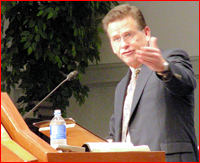 After the offering, Roy Hargrave spoke. He began with well-deserved thanks and words of appreciation for the people of Bethel Baptist Church, Pastor Bill Ascol, Tom Ascol, and others who organized the conference.
After the offering, Roy Hargrave spoke. He began with well-deserved thanks and words of appreciation for the people of Bethel Baptist Church, Pastor Bill Ascol, Tom Ascol, and others who organized the conference.

 'm skipping the description of preliminaries, announcements, songs, and whatnot, because I got waylayed in the hallway between sessions by people who wanted to talk, and I missed most of the prefatory activities for this session.
'm skipping the description of preliminaries, announcements, songs, and whatnot, because I got waylayed in the hallway between sessions by people who wanted to talk, and I missed most of the prefatory activities for this session.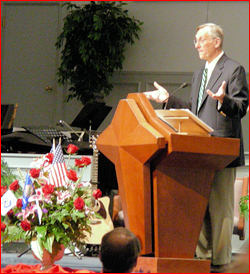 Hebrews 2:8-9: "In putting everything under him, God left nothing that is not subject to him. Yet at present we do not see everything subject to him. But [what] we [do] see [is] Jesus, who was made a little lower than the angels, now crowned with glory and honor because he suffered death, so that by the grace of God he might taste death for everyone."
Hebrews 2:8-9: "In putting everything under him, God left nothing that is not subject to him. Yet at present we do not see everything subject to him. But [what] we [do] see [is] Jesus, who was made a little lower than the angels, now crowned with glory and honor because he suffered death, so that by the grace of God he might taste death for everyone." t's
t's  Thursday, and though we have greatly enjoyed every session of the conference, we are exhausted. Last night, after the evening session here at the Founder's Conference, we attended a service at
Thursday, and though we have greatly enjoyed every session of the conference, we are exhausted. Last night, after the evening session here at the Founder's Conference, we attended a service at 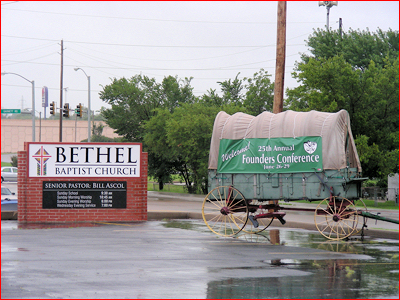
 Isaac married Christina (Kitty) Polk, a relative of James K. Polk. Her parents were killed by Indians, but the effect of this was only to stir in her a desire to see Native Americans reached with the gospel.
Isaac married Christina (Kitty) Polk, a relative of James K. Polk. Her parents were killed by Indians, but the effect of this was only to stir in her a desire to see Native Americans reached with the gospel. Let me say that I'm proud of all of you for enduring my lousy liveblogging. Pheh upon me for being such a lousy formatter and note-taker. I hope these notes do someone some good.
Let me say that I'm proud of all of you for enduring my lousy liveblogging. Pheh upon me for being such a lousy formatter and note-taker. I hope these notes do someone some good.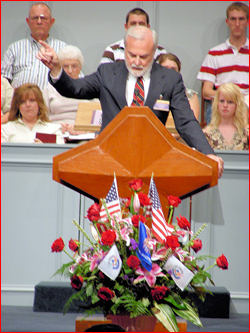
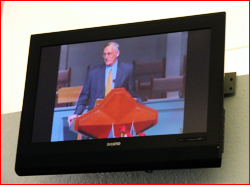 Consider Eph 2: the spirit of disobedience is in the children of wrath, those who are in fallen culture. We need to be redeemed from sin and from walking in the course of the world. This double redemption is freedom from bondage of both nature and culture.
Consider Eph 2: the spirit of disobedience is in the children of wrath, those who are in fallen culture. We need to be redeemed from sin and from walking in the course of the world. This double redemption is freedom from bondage of both nature and culture.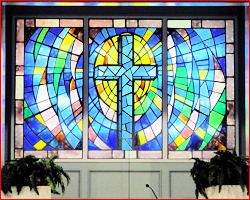 When we come to John 3:16, this message connects to the other things – the whole story – without which the cross is incomprehensible.
When we come to John 3:16, this message connects to the other things – the whole story – without which the cross is incomprehensible.
 [2] "how to".
[2] "how to". 
 Hopeful signs:
Hopeful signs: ore liveblogging!
ore liveblogging! We opened with a favorite hymn, "How Firm a Foundation," accompanied by piano, guitar, organ and violin. Even a single violin adds a surprising depth to the instrumentals.
We opened with a favorite hymn, "How Firm a Foundation," accompanied by piano, guitar, organ and violin. Even a single violin adds a surprising depth to the instrumentals. He said we do not always know the line between Christ and culture, as it has been crossed seriously and repeatedly. The person of Christ has been reconstructed often through the ages, to fit individuals' desires or needs. Thomas Jefferson, in the White House, razor literally in his hand to cut out the portions of the gospels that offended his deistic sensibilities, is an example. Liberals re-mold Jesus into a great social worker. Or Jesus has been made a business executive, who found twelve individuals and took control of the market. Arthur Blessit, saying not to drop acid, but to drop Matthew, Mark, Luke and John.
He said we do not always know the line between Christ and culture, as it has been crossed seriously and repeatedly. The person of Christ has been reconstructed often through the ages, to fit individuals' desires or needs. Thomas Jefferson, in the White House, razor literally in his hand to cut out the portions of the gospels that offended his deistic sensibilities, is an example. Liberals re-mold Jesus into a great social worker. Or Jesus has been made a business executive, who found twelve individuals and took control of the market. Arthur Blessit, saying not to drop acid, but to drop Matthew, Mark, Luke and John.

 e arrived at Bethel Baptist Church and enjoyed warm greetings. Frank and I basked in Phil's popularity. (Hey,
e arrived at Bethel Baptist Church and enjoyed warm greetings. Frank and I basked in Phil's popularity. (Hey,  This is the conference primarily for Southern Baptists interested in the proclamation of the Biblical doctrines of grace within the Southern Baptist Convention, though not all present are SB's.
This is the conference primarily for Southern Baptists interested in the proclamation of the Biblical doctrines of grace within the Southern Baptist Convention, though not all present are SB's. First, a controlled derision (v. 4). God laughs, and holds them in derision. God is not pacing back and forth helplessly, like the God of popular theology. He sits on His throne in absolutely control.
First, a controlled derision (v. 4). God laughs, and holds them in derision. God is not pacing back and forth helplessly, like the God of popular theology. He sits on His throne in absolutely control. ow's this for an idea? A translation of Scripture that takes postmodern inclusiveness to the furthest extreme, dumbs down the text to something less than MTV level, and changes all the politically-incorrect parts to make them teach the opposite of what they mean?
ow's this for an idea? A translation of Scripture that takes postmodern inclusiveness to the furthest extreme, dumbs down the text to something less than MTV level, and changes all the politically-incorrect parts to make them teach the opposite of what they mean? It's been done. Seriously. I'm not making this up.
It's been done. Seriously. I'm not making this up.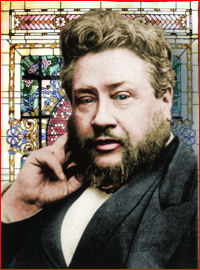 The
The  h that thou, the God of Israel, the covenant God, would bless me indeed! The very pith of the prayer seems to lie in that word, "indeed."
h that thou, the God of Israel, the covenant God, would bless me indeed! The very pith of the prayer seems to lie in that word, "indeed."






 You know: like sticking a picture of a sexy girl on a billboard to get you to read the name and address of your local casino or whatever.
You know: like sticking a picture of a sexy girl on a billboard to get you to read the name and address of your local casino or whatever.








